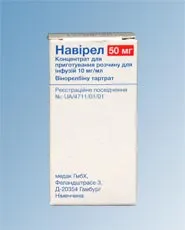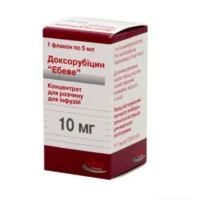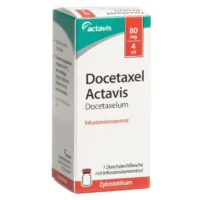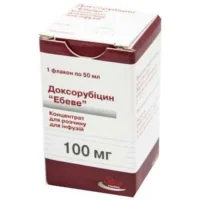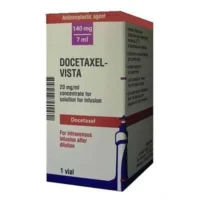Description
Navirel (vinorelbine) Infusions 10 mg/ml. 5 ml. (50 mg.) Vial №1
Ingredients
- Active ingredient: Vinorelbine
- Inactive ingredients may include mannitol, sodium chloride, and water for injection
Dosage
Dosage: The recommended dose of Navirel is based on body surface area and should be administered under the supervision of a healthcare provider experienced in the use of cancer chemotherapeutic agents.
Indications
Indications: Navirel is indicated for the treatment of advanced non-small cell lung cancer and metastatic breast cancer.
Contraindications
Contraindications: Navirel is contraindicated in patients with a history of hypersensitivity to vinorelbine or any of the inactive ingredients in the formulation.
Directions
Administration: Navirel should be administered intravenously over 6-10 minutes. The infusion solution should be prepared using aseptic technique.
Scientific Evidence
Vinorelbine, the active ingredient in Navirel, is a vinca alkaloid that disrupts microtubule formation in cancer cells, leading to cell cycle arrest and apoptosis. Clinical trials have demonstrated the efficacy of vinorelbine in the treatment of various cancers, including non-small cell lung cancer and metastatic breast cancer.
Additional Information
Navirel may cause myelosuppression, peripheral neuropathy, and gastrointestinal toxicity. Patients should be monitored closely for these adverse effects during treatment. It is essential to follow proper handling and disposal procedures for cytotoxic drugs to minimize the risk of exposure.
- Pharmacologically, Navirel exerts its effects by interfering with the assembly of microtubules, essential components for cell division.
- By disrupting this process, vinorelbine inhibits the growth of cancer cells, ultimately leading to their death.
This mechanism of action makes Navirel an important agent in the treatment of certain types of cancer.
Clinical trials have shown that Navirel, when used in combination with other chemotherapy agents or as a single agent, can significantly improve progression-free survival and overall survival in patients with advanced lung or breast cancer. These findings highlight the importance of vinorelbine in the oncology treatment landscape.

